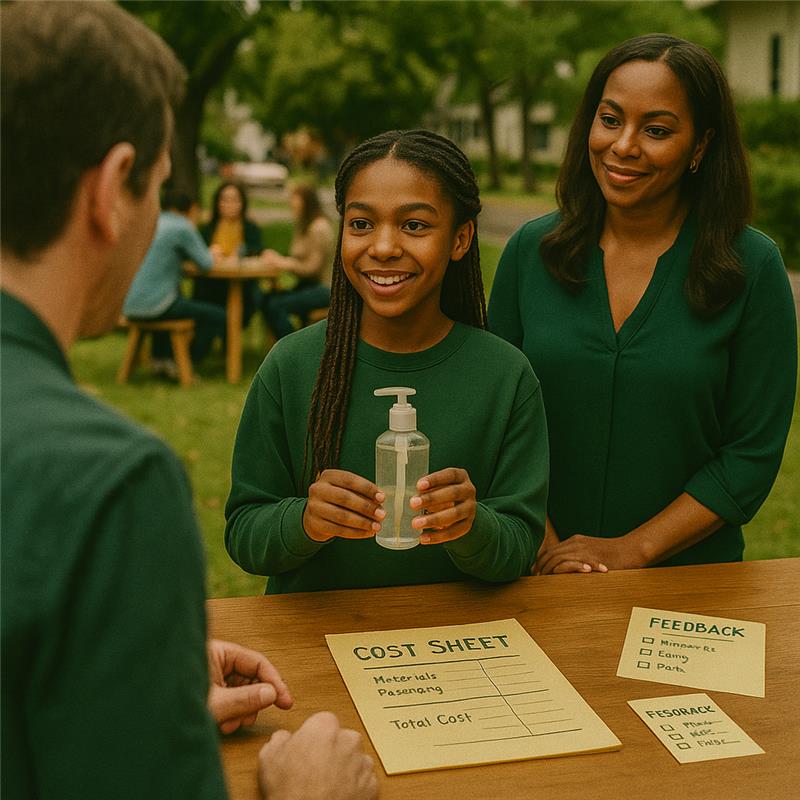
Starting a business as a kid isn’t just about earning money—it’s about turning ideas into reality, building self-belief through action. From sketch to sale, young entrepreneurs learn their ideas matter, effort counts, and progress comes one step at a time.
With Thousand-Aires, kids transform doubt into confidence, moving from “Can I?” to “Here’s what I’m building next.”
Jada’s Study Snacks: From Idea to Impact
Jada, an eighth-grader, saw classmates skipping lunch before tests and launched “Study Snacks”—pre-order bags with fruit, trail mix, and a motivational sticker. Her first week brought six orders but two missed pickups. Instead of giving up, Jada added reminder texts and a pickup window chart, doubling orders the next week.
Her biggest win wasn’t profit—it was proof she could spot a need, communicate clearly, adapt quickly, and deliver value reliably.
How Entrepreneurship Builds Confidence
Small ventures teach kids skills that strengthen self-belief:
- Voice: Pitching to customers and asking for feedback builds clear, fearless communication.
- Judgment: Pricing, tracking costs, and setting priorities turn guesses into confident decisions.
- Resilience: When deliveries fail or ideas miss, kids iterate, learning failure is just data, not defeat.
This try–learn–refine–repeat cycle builds confidence that compounds in real-world contexts.
Start Small, Learn Big
A confidence-building venture needs only a small idea and a quick test:
- Pick a Nearby Problem: Offer digital study guides, tutoring sessions, pet care, or custom bracelets that fit a school-week schedule.
- Pilot with Five Customers: Test your idea with a small group to learn fast and keep risks low.
- Track Progress: Use a one-page plan and Google Sheets to log price, costs, and margins for clear, measurable wins.
Parents and Mentors: Fostering Growth
Adults can spark confidence by:
- Providing a Tiny Seed Fund: Offer $10–$20 for supplies to start small.
- Creating a Safe Space: Encourage testing ideas without fear of failure.
- Asking Reflective Questions: Weekly, ask “What worked?” and “What’s next?” to focus on iteration.
A 15-minute weekly review—celebrating wins, noting here bottlenecks, and planning one improvement—helps kids own their growth.
School First, Hustle Second
Balance builds lasting confidence:
- Prioritize Non-Negotiables: Lock in school, rest, and commitments before scheduling hustle tasks.
- Use Maintenance Mode: During exams or busy weeks, answer messages, fulfill orders, and pause promotions to protect grades and trust.
- Stay Consistent: Small, steady cycles (e.g., 2–3 hours weekly) beat intense, sporadic pushes.
Use Google Calendar to time-block tasks and keep the hustle manageable.
Practical Tips to Boost Confidence
- Set a Weekly Goal: Define a “minimum viable output” (e.g., 10 messages, 2 deliveries, 1 tweak) for steady progress.
- Involve Customers: Ask them to suggest one feature or flavor to build buy-in and social proof.
- Reward Discipline: Reinvest a portion of earnings, save a reserve, and pay a small “founder dividend” to celebrate consistency.
The Transformation Thousand-Aires Sees
Kids who try entrepreneurship carry new confidence into classrooms, interviews, and community projects. They speak clearly, solve problems with empathy, and plan with purpose. Confidence isn’t just a feeling—it’s a muscle built by delivering value, learning from mistakes, and iterating.
Give a young person a chance to build, and they’ll carry self-belief far beyond their first venture.
Ready to Spark Confidence?
Pick a small idea, test it this week, and see what you can build. Start simple with Thousand-Aires!
Email: info@thousand-aires.com
Phone: 844-370-7227 (TACT)
Website: thousand-aires.com
